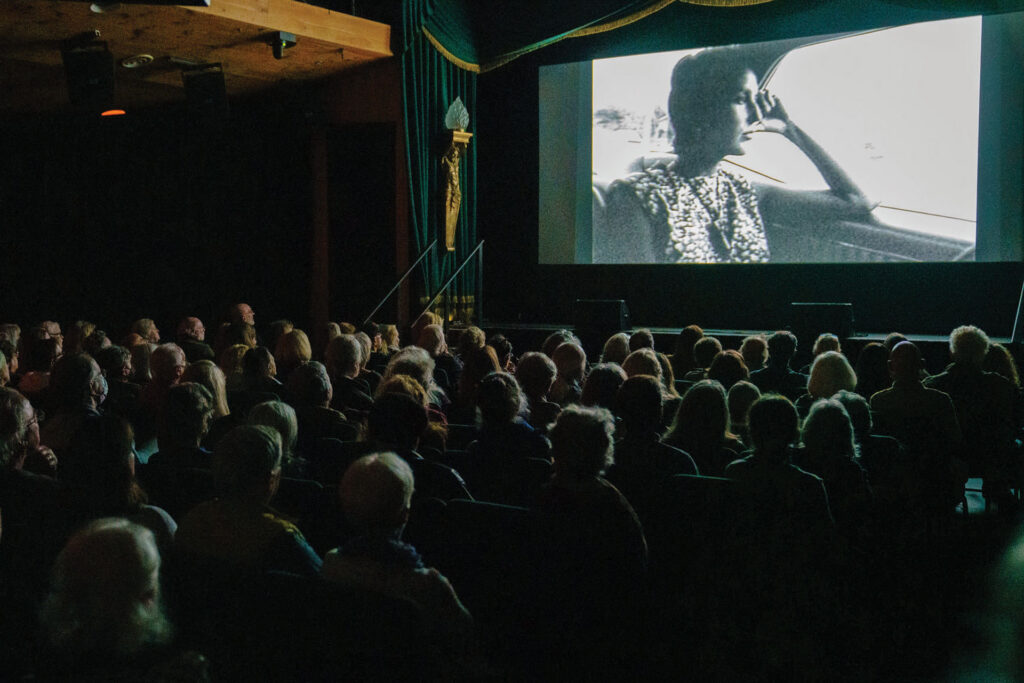As the local cinephile’s favorite movie festival turns 25, WFF reveals it’s just getting started.
By Isabella Joslin
As the Woodstock Film Festival (WFF) celebrates its 25th anniversary this year, it stands as a testament to the enduring power of independent cinema and the profound impact of art on community building. Founded in 2000 by Meira Blaustein, Laurent Rejto and a group of passionate volunteers, the festival has grown from a modest affair into a professionally run organization with global recognition. Over the past quarter-century, it hasn’t only become a significant player in the independent film world but has also deeply influenced the cultural landscape of the Hudson Valley, enriching the region’s artistic legacy.
Reflecting on the festival’s journey, Blaustein highlights the evolution WFF has undergone. “The festival began as a small grassroots event driven by lots of love and hard work, created without any funding whatsoever, no celebrity power and all volunteers,” she says.
Today, the festival is a well-oiled machine, employing more than 60 staff members and operating year-round. It’s now considered one of the top regional film festivals in the US, attracting filmmakers and audiences from around the world. This growth has been both organic and deliberate, with the festival staying true to its core values while continuously adapting to the changing landscape of cinema and community.
“We’re proud to have cultivated a global community that continues to grow and enhance the goals the Woodstock Film Festival has always strived for,” Blaustein says.
Indeed, WFF has been an undeniable driving force behind the artistic growth of the Hudson Valley, acting as an anchor for the region’s creative industries. The festival has played a pivotal role in shaping the Hudson Valley’s reputation as a hub for artists and filmmakers. From its inception, WFF has encouraged attendees to explore the rich cultural and natural beauty of the region. “Festival events are spread out across the Hudson Valley, primarily in towns with artistic and cultural history going back decades,” Blaustein says.
This connection between the festival and the local communities has been mutually beneficial, with the festival drawing visitors who, in turn, invest in the area’s businesses, arts organizations and cultural institutions. Over the years, WFF has also collaborated with numerous local entities, such as the Center for Photography at Woodstock and the historic Bearsville Theater, further embedding itself in the local arts scene. Through year-round programming, including film screenings and the Youth Film Lab, WFF offers a multitude of opportunities for community members to engage with the film world. These initiatives have not only enriched the local arts community but have also helped cultivate a new generation of filmmakers and film enthusiasts.
The Woodstock Film Festival’s ability to adapt to change has been a hallmark of its success. Blaustein points to two particularly devastating events in the festival’s history: 9/11 and the global pandemic. In both instances, the festival demonstrated its resilience and commitment to its community. In 2001, just nine days after the September 11 attacks, WFF went ahead with its second edition, providing a space for healing and reflection during a time of national crisis.
“Many thought the festival would be canceled that year, but it wasn’t,” Blaustein says. Instead, the festival served as a refuge for those seeking solace in the power of storytelling. Similarly, in 2020, the festival adapted to the challenges of the pandemic by embracing virtual programming and utilizing local drive-in theaters. This innovative approach allowed WFF to continue its mission of connecting filmmakers with audiences, even in the face of unprecedented circumstances. “This shows the festival’s commitment to our community, our desire and ability to serve as a beacon for important conversations and collective healing in the midst of an ever-changing world,” she says.
As WFF looks to the future, it remains committed to supporting both emerging and established filmmakers while continuing to grow its artistic community. Blaustein envisions the festival as an ever-evolving entity, open to new directions and initiatives.
“The festival is ever-changing, but the decisions we make will always be designed with our incredible and engaged community completely in mind,” she says.
Blaustein says one of the festival’s ongoing goals is to explore how it can further support the creative process while creating career opportunities and enriching the lives of the Hudson Valley community. It would seem that this unflinching and dedicated commitment to both artistic excellence and community engagement has been a driving force behind much of WFF’s success and will undoubtedly continue to shape its future.
The 25th anniversary of the Woodstock Film Festival isn’t just a mere celebration of the festival itself but also a joyous milestone for the community that has supported it. Looking back, Blaustein expresses gratitude for the love the festival has received from sponsors, volunteers and the local community. “The support for the festival has grown over time,” she says, with industry giants Netflix and Amazon joining long-time local sponsors in backing the festival’s mission.
As WFF reaches their current milestone, it remains a vivid example of how a small, passionate idea can grow into something indisputably extraordinary. The festival’s lasting success is a testament to the power of art to bring people together, to inspire and to heal. As the Woodstock Film Festival continues to evolve and expand, it looks to remain a beacon of creativity and community. Pretty ambitious and pretty darn great.

Comments are closed.